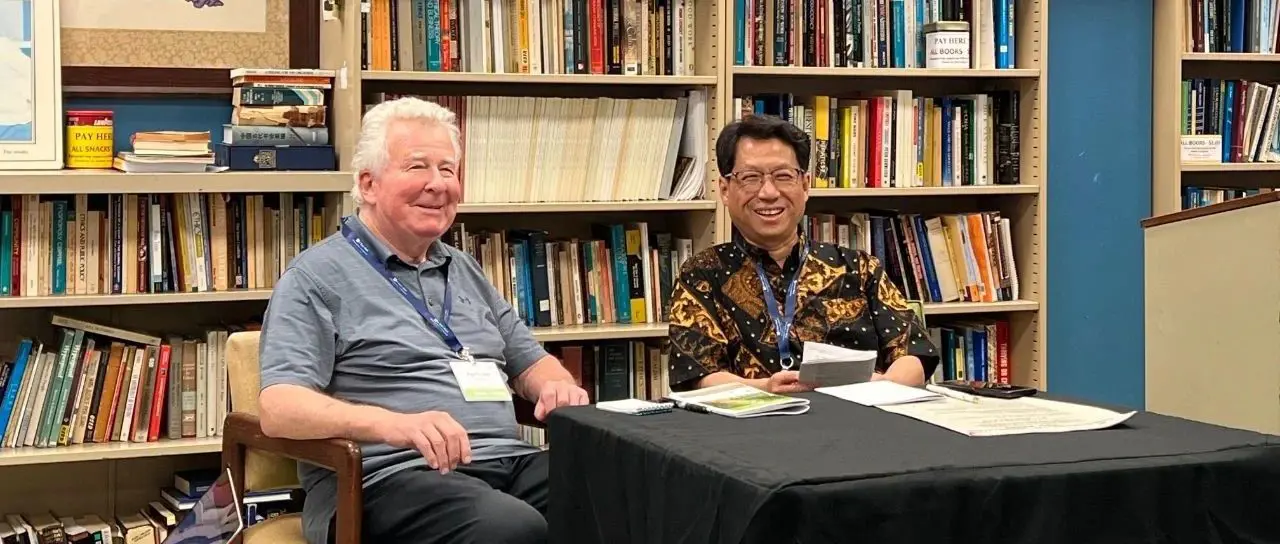Xu Ke-qian: The Enlightenment of Chinese Philosophy on the Issues Faced by the World Together

The number of people studying and interested in Chinese philosophy around the world is growing, and Chinese philosophy is playing an increasingly significant role on the global philosophical stage. Reporter from China News Service, Men Rui.

The world today faces global challenges such as economic deglobalization, climate change, and public health crises. Countries respond based on their own national conditions and political orientations, reflecting their respective philosophical traditions.
In the context of the current changes in the world, the era, and history, what is the inevitability and necessity of the rise of non-Western philosophical studies? What answers does Chinese philosophy provide in the face of social issues that the world collectively faces? How should non-Western philosophies respond when Western philosophy holds a universal advantage? Recently, Professor Xu Ke-qian from Nanjing Normal University accepted an interview with China News Service's "East and West" to interpret these issues.
The following is a summary of the interview transcript:
Reporter from China News Service: What has been the long-term structure of the world's philosophical landscape? What new changes are there currently?
Xu Ke-qian: The term "philosophy" originated in ancient Greece, meaning "love of wisdom," and refers to the intellectual activity of sages exploring fundamental concepts, principles, and values of the world and human society. Although ancient China did not have the word "philosophy," such intellectual activities existed in the doctrines of Confucianism, Taoism, Legalism, Mohism, and the School of Names. It can be said that the Chinese nation has had its own philosophy since ancient times, and so have other nations.
For a long time in the past, Western philosophy held a monopoly position in the philosophical field. In recent decades, this situation has greatly improved. When studying and teaching Chinese philosophy in foreign universities, it used to rely on programs such as "East Asian Studies" or "Chinese Studies," but now it is more commonly included in the philosophy department. Similarly, African philosophy, Indian philosophy, Islamic philosophy, and other non-Western philosophies are gradually gaining their deserved status in the global philosophical landscape. Only when the philosophies of all regions and ethnic groups are fully represented can we truly talk about "world philosophy."
A photo of Xu Ke-qian with Ramos, a member of the Executive Committee of the International Federation of Philosophical Societies and a renowned African philosopher, taken at the 24th World Philosophy Congress held in Beijing in the year and month. Photo courtesy of the interviewee.
Reporter from China News Service: How should we understand "Chinese philosophy"?
Xu Ke-qian: "Chinese philosophy" is extremely rich and complex in its connotations, constantly evolving, yet it also possesses a unique consistency. I believe there are three points that stand out: the "systematic concept," the "middle way thinking," and the "practical rationality."
The concept of system refers to the Chinese philosophical view of the world and all things as systems, wholes, panoramas, and dynamic entities. The existence of any thing is not isolated and static, but is embedded in interconnected and dynamic relationships. The ancient Chinese believed that yin and yang complement and interact, and the five elements (metal, wood, water, fire, earth) generate and restrain each other, forming organic connections that constitute a dynamic system. This determines the value and role of individuals within the system; without the system, the individual ceases to be what it is.
The concept of "middle-way thinking" in Chinese philosophy refers to the use of "adhering to the middle" and "using both extremes to find the middle" as methods of thought, aiming for "achieving harmony and balance" as the direction of thought, and considering "the middle way" as the fundamental and constant principle. It avoids rigidity and extremism, embraces diversity and differences, and does not argue about absolute right and wrong. Instead, it focuses on exploring the "middle" that is appropriate in the present moment and the "degree" that is neither excessive nor insufficient, seeking relative balance and harmony amidst contradictions and uncertainties. "Middle" is not static; it adjusts to the situation and conditions to always find the "middle."
Practical reason means that Chinese philosophy rarely explores those transcendental, absolute "being" or "existence" without departing from human practical activities, but seeks "being" in facts and explores feasible paths in practice. Chinese philosophy has always had the tradition of "unity of knowledge and practice," not just engaging in theoretical discussions in the ivory tower, but also permeating philosophical principles in personal cultivation, interpersonal conduct, and even the practice of governing the country and the world.
Reporter from China News Service: What is the situation of Chinese philosophy in the field of world philosophy?
Xu Ke-qian: The number of people studying and interested in Chinese philosophy around the world is increasing, and Chinese philosophy is playing an increasingly important role on the world philosophical stage. In fact, the doctrines of ancient Chinese Confucianism and Taoism have always had some dissemination and influence worldwide. However, within the field of philosophy, Chinese philosophy, like other non-Western philosophies, has faced difficulties.
Since the discipline of philosophy first took shape in the West, its categories, concepts, and discourse systems have been standardized by Western philosophy. Other philosophies, in order to be recognized as "philosophy," often need to consciously or unconsciously apply the paradigms of Western philosophy to explain themselves, thereby proving their so-called "legitimacy."
In this context, some so-called Chinese philosophy studies actually "apply" Western philosophical concepts and discourse systems to Chinese philosophy. Of course, there are also many Chinese philosophy researchers who strive to highlight the unique conceptual and discourse systems of Chinese philosophy, despite facing difficulties in language interpretation. They still attempt to enter the international academic arena to engage in philosophical dialogue.
On the date of the month in the local time, the 18th East-West Philosophers' Conference held a roundtable discussion on "Family Philosophy" in Honolulu, the capital of the state of Hawaii, USA. Pictured are Professor Roger T. Ames, Chair Professor of Humanities at the Department of Philosophy, Peking University, and Professor Wen Haiming, Deputy Director of the Níshān Center for Confucian Studies and Professor at the School of Philosophy, Renmin University of China (right), who served as the chairpersons of this "Family Philosophy" roundtable. Photo by reporter Zhang Shuo, China News Service.
Reporter from China News Service: When Western philosophy enjoys a widespread advantage globally, how should Chinese philosophy and other non-Western philosophies respond?
Xu Ke-qian: The research object of philosophy is the spiritual world, involving concepts and values, closely related to national spirit and ideology. The long-standing dominant position of Western philosophy is actually a reflection of the monopoly of Western cultural and ideological discourse, but this monopoly is being broken.
Facing this situation, non-Western philosophy must first establish cultural confidence. Each ethnic culture has its own characteristics and strengths, all of which can contribute to human rationality and spiritual activities. Secondly, there must be a bold spirit of innovation. Western philosophy is merely "one" philosophy, not the "only" philosophy. Its paradigms are merely human-made frameworks, not a priori, eternal, or unbreakable. Non-Western philosophy can explore the philosophical resources of its own ethnic group for innovation, proposing new philosophical categories, concepts, and discourse systems.
Reporter from China News Service: Against the backdrop of the profound changes in the world, the era, and history, what is the inevitability and necessity of the rise of research on Chinese philosophy and other non-Western philosophies?
Xu Ke-qian: From the perspective of Chinese philosophy, everything in the world is constantly changing, and human society is no exception. In the past, certain spirits in Western culture promoted the progress of human civilization and had their historical mission, but some of their flaws and internal contradictions also led to decline, which is a historical inevitability. However, this historical inevitability is different from the "end of history" envisioned by Western philosophy based on linear evolutionism. We believe that history has no end, but will continue to move forward in cycles of rise and fall.
Currently, China has embarked on a unique path of modernization with Chinese characteristics, achieving remarkable accomplishments that have captured global attention. From a philosophical perspective, it is necessary to elucidate the internal logic and rationality behind these achievements, construct a discourse system at the theoretical level of philosophy, and interpret China's development through indigenous philosophy. This approach aims to avoid the predicament of being unable to articulate our reasoning clearly or find a platform to express it in the international public sphere. The practical necessity of the rise of Chinese philosophy is thus vividly demonstrated.
Reporter from China News Service: How is the dialogue between Chinese philosophy and African philosophy in the study of non-Western philosophy?
Xu Ke-qian: Since the mid-century, research on African philosophy abroad has emerged as a significant force, achieving substantial development. Outside of Africa, many university philosophy departments have introduced courses on African philosophy. In China, some scholars engaged in African studies have also conducted research in related philosophical fields, but the dialogue and exchange between Chinese philosophy and African philosophy are currently still relatively limited. In fact, African philosophy shares many commonalities with Chinese philosophy, and like Chinese philosophy, it also bears the responsibility of promoting national spirit and enhancing national self-confidence to a certain extent.
African philosophy and Chinese philosophy share or resemble each other in their understandings of "existence," the relationship between the individual and the collective, modes of thinking and logical methods, as well as certain topics in political philosophy. Some scholars have compared the African philosophical concept of "Ubuntu" with Confucian benevolence. This comparison and dialogue between Chinese philosophy and African philosophy or other non-Western philosophies can break through long-standing paradigms of thought, bringing other possibilities to philosophical research.
Reporter from China News Service: What enlightening solutions does Chinese philosophy offer to the social issues that the world currently faces collectively?
Xu Ke-qian: In response to the social issues that the current world collectively faces, Chinese philosophy offers some inspirations that differ from Western philosophy.
For example, Western philosophy tends to define and label things, drawing absolute distinctions between what is and what is not. In social and political issues, it often uses dichotomies such as freedom or authoritarianism, democracy or authoritarianism, market economy or government control, leading to ideological opposition and triggering conflicts. In Chinese philosophy, these concepts are seen as complementary and interdependent, mutually restraining and correcting each other, forming different "degrees" under different conditions, maintaining dynamic balance in the overall society.
For instance, Western thinking tends to prioritize the individual, starting from "I," often leading to unilateralism, double standards, and self-priority. Chinese philosophy, on the other hand, emphasizes harmony between humans and nature, society, and between self and others, even promoting the concepts of "no self" and "forgetting oneself," integrating the self into the great way. Therefore, the soil of Chinese philosophy has given rise to the concept of a community with a shared future for mankind.
The current world is generally faced with contradictions such as economic development versus environmental protection, technological advancement versus employment security, and globalization versus national interests. Based on actual circumstances, we can find the appropriate "degree" between the two sides of the contradiction, which is also inspired by the Chinese philosophical concept of the "Middle Way."
Interviewee Profile:*
Xu Keqian. Photo provided by interviewee.
徐克谦,哲学博士,南京师范大学文学院古代文学专业教授、博士生导师。研究领域主要涉及先秦诸子思想、先秦哲学、早期儒家、庄子、孟子、中西思想传统比较等。先后主持江苏省哲学社会科学基金项目2项、国家社科基金“中华外译”项目1项。已出版有专著、译著、个人论文集、古籍整理著作、教材、普及读物等20多种,在国内外学术刊物发表中、英文学术论文100多篇。
Title: "Xu Ke-qian: The Inspiration of Chinese Philosophy for the World's Commonly Faced Issues - East and West" Text Editor: Wang Suning Photo Editor: Cui Chuqiao Layout: Liang Jing Proofreading: Wei Yuan Editor: Cheng Chunyu
[
German Sinologist Hans van Ess on Classical Chinese: Inheritance and Progress in the Times
](http://mp.weixin.qq.com/s?__biz=MjM5NDI2MDc5NA==&mid=2659529360&idx=1&sn=8f4dd7e538e82656a9647aad5fa10f12&chksm=bdfbe0c58a8c69d374a47bd3130bbe067d7559cf9c836e435cf1b6f83275703d5b17af2b89f9&scene=21#wechat_redirect)
[
How can the discipline construction of Chinese classical studies be implemented?
](http://mp.weixin.qq.com/s?__biz=MjM5NDI2MDc5NA==&mid=2659529360&idx=2&sn=ba622c6d2896197ac85756b77f2931a7&chksm=bdfbe0c58a8c69d3c8e889058bef12d1db1376a9e113f06ca2a75f806e5e0bf0db3d00d4d544&scene=21#wechat_redirect)
[
Greek Scholar: The Classical Studies of East and West are Essentially Astonishingly Similar
](http://mp.weixin.qq.com/s?__biz=MjM5NDI2MDc5NA==&mid=2659528844&idx=1&sn=7577faec2e383cc3509c381018393e8d&chksm=bdfbe2d98a8c6bcfe91427c26831470e8f2577707535201803e8cceb86b76e1450429c350371&scene=21#wechat_redirect)

